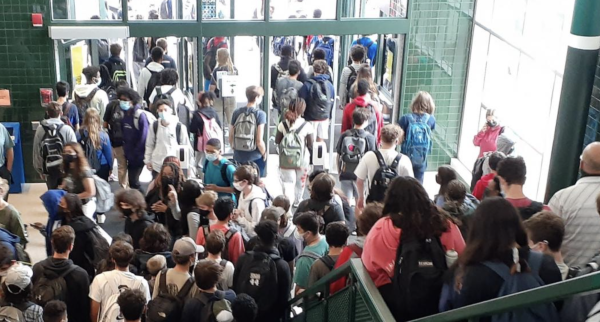A Midterm Election of Presidential Proportion
During years in between presidential elections, lawn signs crop up like seasonal weeds. They advertise various political candidates, often ranging from local candidates to congressional ones. It’s hard to go anywhere without seeing an unhealthy amount of them. You might think they’re a nuisance, but they represent a microcosm of our democratic process at the most local level.
Our most recent election has since wrapped up, but local government offices across the country are still working diligently to finalize election results. Government workers are feeling the brunt of thousands and thousands of voters—the turnout of this election was relatively high compared to midterm elections of the past. According to research conducted by Tuft University’s Center for Information and Research on Civic Learning and Engagement, about 27% of people aged 18 to 29 voted in this election, which is the second-highest turnout in the age bracket in 3 decades, topped only by the turnout during the 2018 midterm election. In fact, the increase in voter turnout is primarily attributed to young voters.
Much can be said about the turnout rates of this election, but let’s take a look at the results first: In the House, Republicans have gained control, but not by the margin they expected. The “Red Wave” that Republicans were promised fell short—very short, actually, when compared to previous midterm elections. (The Democrats lost many seats during the 2010 midterm election—Obama called it “a schellacking.”) As of right now, the GOP has 220 seats in the House, and the Democrats have 212 seats. In the Senate, the GOP has 49 seats and the Democrats have 48 seats. Georgia will have a runoff election in December, since no candidate has received the necessary percentage of votes to secure the election.
Some states also voted for governors in this election. Republican Greg Abbott, the incumbent governor of Texas, defeated democrat Beto O’Rourke in a state still reeling from the mass shooting at Uvalde. Ron Desantis, the Floridian incumbent, also won reelection against democrat Charlie Crist. New Jersey did not have a governor and Senate race this election cycle.
Data is all fine and good, but it’s also important to consider how this election will affect us on various levels, either nationally, statewide, district-wide, or locally.
Nationally, we will see a shift in the political makeup of Congress. It will be harder for President Biden to complete his policy goals with a Republican-majority House. However, since the Republican majority is rather slight, it will be easier for President Biden to persuade members of the GOP to support his plans. The outcome of the Senate race is still in the air; Georgia’s runoff election between Democratic incumbent Raphael Warnock and Republican Herschel Walker could have a profound impact on how Congress operates.
Hunterdon County’s election results are particularly interesting. Voters came out in droves; 57.35% of eligible voters in Hunterdon cast ballots. Perhaps the most talked about race in Hunterdon was the House of Representatives race between Democratic incumbent Tom Malinowski and Republican Tom Kean Jr. Kean came out on top, receiving about 54% of votes.
Sue Duggan, Jerry Rymar, and Rebecca Petersen have been elected to Hunterdon Central’s Board of Education. School board elections have become increasingly polarizing, with some candidates being endorsed by national figures. The politicization of school boards is primarily due to conflicts over what should be taught in schools and how schools should respond to events such as the Covid pandemic.
What we have now is data. We will only know how this data will transform our democratic process several years down the road. With only two years left in President Biden’s term and Republican challengers already announcing their candidacies for the 2024 election, the outcome of this most recent midterm could potentially define the course of Biden’s presidency. The ability for him to pass new legislation proficiently depends heavily on cooperation within Congress; if he doesn’t have it, it will be hard to provide the public with the promises of his presidential campaign. The importance of midterm elections to the functionality of the national government cannot be overstated.










